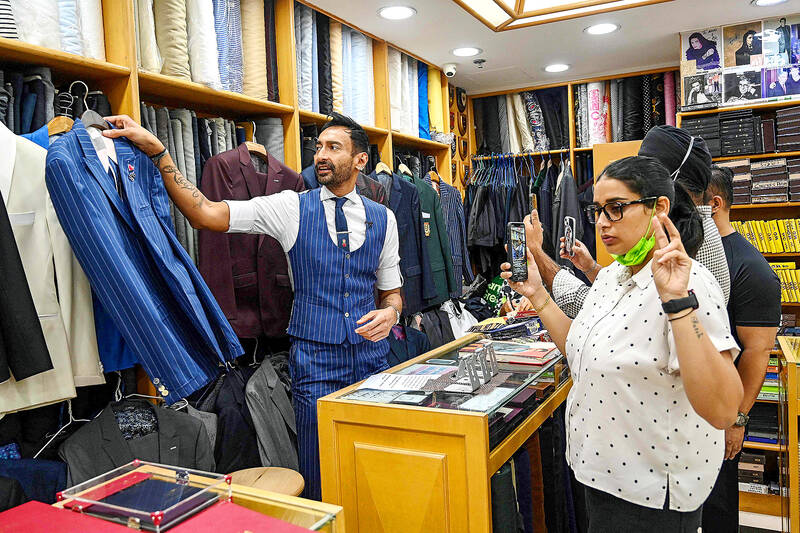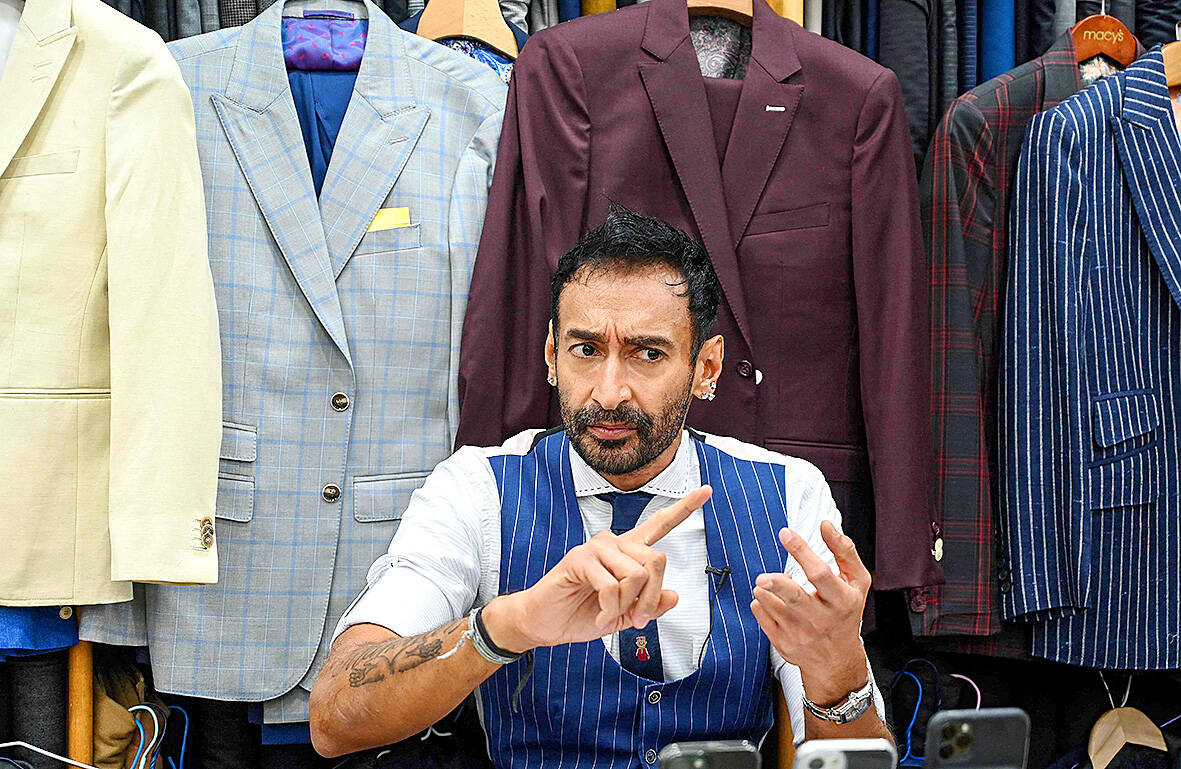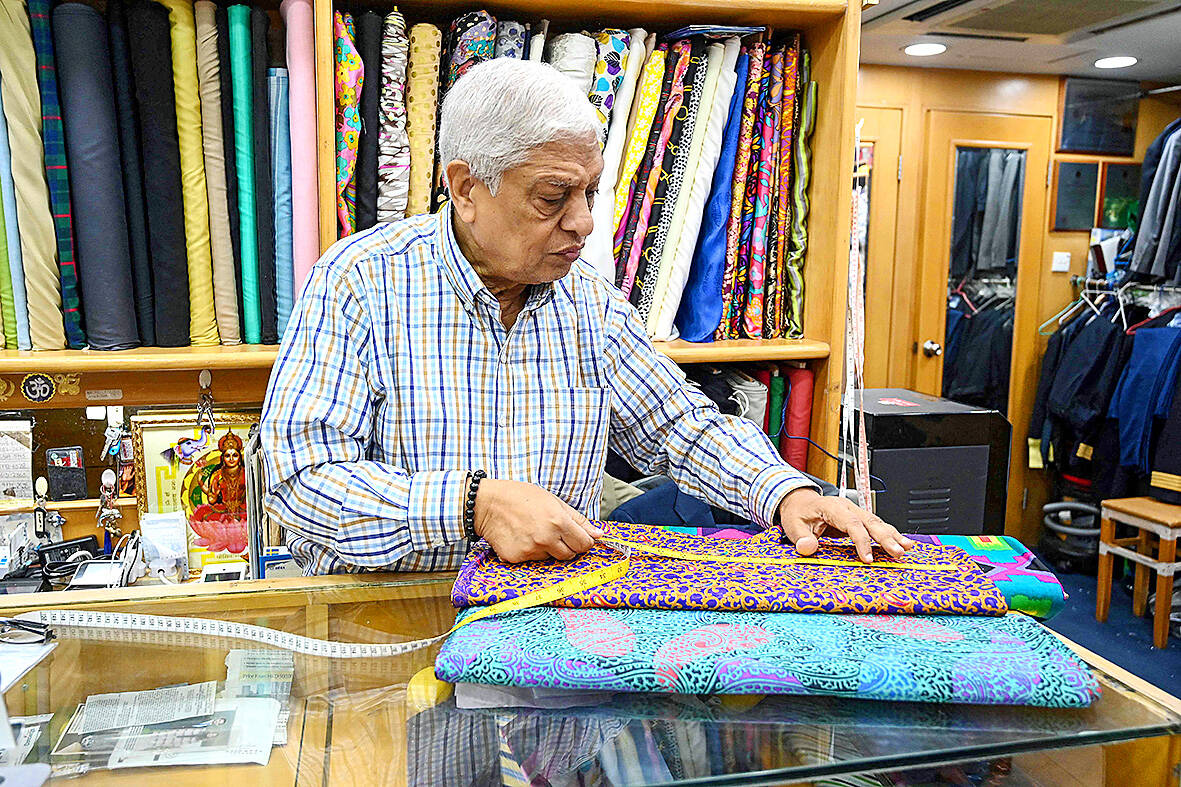Assistants wielding multiple livestreaming mobile phones are now as crucial to Roshan Melwani’s tailor shop as the measuring tapes, needles and fabrics that have made his Hong Kong family business so famous.
The Melwani family has dressed everyone from American presidents to aristocrats and celebrities over the decades. But the pandemic nearly sunk them — and many of Hong Kong’s once thriving tailoring businesses have not survived.
Few places remained internationally cut-off during the coronavirus pandemic for as long as Hong Kong, a self-imposed isolation that the city’s government has only begun to lift in the last two months.

Photo: AFP
As a result, Melwani’s shop Sam’s Tailors has been reliant on online sales for most of the last 2.5 years, long after rivals in Saville Row, Milan and New York reopened their doors.
“Understand that if I did not have 60 years of cash behind me, I could not operate,” Melwani, a third-generation tailor, says as a frenetic day of video calls with customers and livestreams to showcase new designs gets underway.
“Pre-pandemic I had a minimum 20 people that I would work with per day, sometimes 40 people, up to six days a week.”

Photo: AFP
QUALITY AND SPEED
Tim, a client in the US, is the kind of customer that has helped keep Sam’s Tailor afloat. During the pandemic, he ordered an entire new wardrobe and now he’s on the look-out for something more daring.
With the help of assistants broadcasting a dizzying array of choices over video call, Melwani steers Tim towards a burgundy three-piece with an inner lining featuring pin-up girls.

Photo: AFP
“Yeah, let’s get to it,” Tim says over the phone as assistants frantically jot down all the extra details in yellow notebooks.
Before the pandemic Hong Kong’s tailors were a must-visit for many tourists thanks to their reputation for quality — and their ability to turn a bespoke suit around as little as 24 hours.
The walls of Sam’s Tailors are festooned with photos of famous patrons, from Bill Clinton, George Bush and Boris Johnson, to Bruno Mars, Russel Crowe and Meghan Markle. The city’s tailoring scene traces its origins back to Shanghai, which was renowned for its quality and craftmanship at the start of the twentieth century.
Many of those tailors relocated to Hong Kong in the aftermath of the Chinese Communist Party’s civil war victory in 1949.
“People can get 10 suits in Hong Kong with the frequency they get one suit in Saville Row,” said Andy Chan, President of the Hong Kong Tailors Association.
“This is why everybody came to Hong Kong to get a custom-made suit for them.”
TOURIST DESERT
In recent years Hong Kong’s tailoring industry has struggled against fast fashion and online sales. But the pandemic has been especially brutal.
Hong Kong went from welcoming 65 million people in 2018 to just 91,000 last year at the height of the pandemic, when all overseas arrivals had to pay for hotel quarantine of up to three weeks.
“We estimate for these four years (2018-2021) we had over 40 percent of the tailors that shut down,” Chan lamented.
Hong Kong only scrapped mandatory hotel quarantine in September, long after rival hubs like Singapore had reopened to the world. Even after that the city was still restricting where tourists could go for the first three days after arriving as they waited for test results, a measure that was removed earlier this month.
Roshan Melwani says there are times he feels angry but he tries not to dwell. “You think it doesn’t hurt my father, all his years of saving money, all that cash gone?” he said. “I don’t have time to feel that hurt, I have to devote my time to taking us forward.”

The slashing of the government’s proposed budget by the two China-aligned parties in the legislature, the Chinese Nationalist Party (KMT) and Taiwan People’s Party (TPP), has apparently resulted in blowback from the US. On the recent junket to US President Donald Trump’s inauguration, KMT legislators reported that they were confronted by US officials and congressmen angered at the cuts to the defense budget. The United Daily News (UDN), the longtime KMT party paper, now KMT-aligned media, responded to US anger by blaming the foreign media. Its regular column, the Cold Eye Collection (冷眼集), attacked the international media last month in

On a misty evening in August 1990, two men hiking on the moors surrounding Calvine, a pretty hamlet in Perth and Kinross, claimed to have seen a giant diamond-shaped aircraft flying above them. It apparently had no clear means of propulsion and left no smoke plume; it was silent and static, as if frozen in time. Terrified, they hit the ground and scrambled for cover behind a tree. Then a Harrier fighter jet roared into view, circling the diamond as if sizing it up for a scuffle. One of the men snapped a series of photographs just before the bizarre

Feb. 10 to Feb. 16 More than three decades after penning the iconic High Green Mountains (高山青), a frail Teng Yu-ping (鄧禹平) finally visited the verdant peaks and blue streams of Alishan described in the lyrics. Often mistaken as an indigenous folk song, it was actually created in 1949 by Chinese filmmakers while shooting a scene for the movie Happenings in Alishan (阿里山風雲) in Taipei’s Beitou District (北投), recounts director Chang Ying (張英) in the 1999 book, Chang Ying’s Contributions to Taiwanese Cinema and Theater (打鑼三響包得行: 張英對台灣影劇的貢獻). The team was meant to return to China after filming, but

Power struggles are never pretty. Fortunately, Taiwan is a democracy so there is no blood in the streets, but there are volunteers collecting signatures to recall nearly half of the legislature. With the exceptions of the “September Strife” in 2013 and the Sunflower movement occupation of the Legislative Yuan and the aftermath in 2014, for 16 years the legislative and executive branches of government were relatively at peace because the ruling party also controlled the legislature. Now they are at war. The Democratic Progressive Party (DPP) holds the presidency and the Executive Yuan and the pan-blue coalition led by the